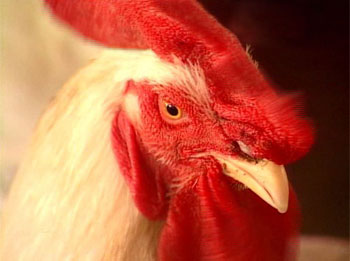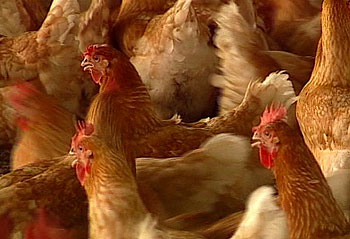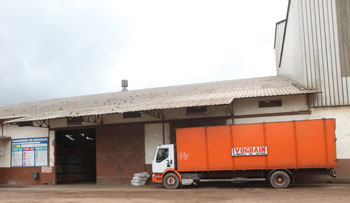Côte d’Ivoire Production Of Animal Feed
Sylvain Gotta, General Director of SIPRA (Société Ivoirienne de Productions Animales)
SIPRA is one of the main producers of animal feed and poultry in Côte d’Ivoire. “Our vision is to have an Africa that is dynamic. Education and quality food are very important factors in an individual’s life. We want to feed Africa, feed her well.”
Interview with Sylvain Gotta, General Director of SIPRA (Société Ivoirienne de Productions Animales)

How would you evaluate the agro-industry sector in 2011 and what are the perspectives for the 2012?
In 2011, the industry was spared from the negative effects of the global economic crisis. We faced some difficulties and a slight decrease in production levels, but overall, the industry’s fundamentals have remained strong. Thus, the global crisis did not adversely affect the company and in the second quarter of 2011, we were able to consolidate and recover some of the losses from 2010.
The company’s business fundamentals were not affected during the recession. With the positive change in the socio-political climate, SIPRA now has the necessary tools to have an even better year in 2012. Our growth prospects are very interesting, allowing the company to remain optimistic for the upcoming year.
What are the key challenges for the food industry?
One main issue that needs improvement is product competitiveness. When comparing West Africa to other economic regions such as Asia, the region’s level of production is not at par. In order to compete with others, SIPRA needs to improve production levels i.e., infrastructure, innovation, modernizing the sector, and bringing new investments into agriculture.

Furthermore, Côte d’Ivoire’s strategic challenge is to reach self-sufficiency in food. In order to do that, the agro industry has to increase output volumes and improve quality. Côte d’Ivoire has the ability to reach self-sufficiency on a local level and also has the capacity to export to the sub-region.
Could you tell us about SIPRA and present the the strategy?
SIPRA is a mature company with 35 years of history. SIPRA is integrated into the agricultural sector and is increasingly involved in animal production. Right now, 800 people depend directly on the company while 15,000 depend indirectly on the company.
SIPRA is organized into different agricultural sub-sectors and has a wide portfolio of brands, such as the animal production – production of animal feed, poultry, cattle, pigs, and fish. These products are sold to Ivorian and sub-regional breeders. Another area of specialization is the production of one day-old chicks for the farmers.
These two businesses target B2B clients: the breeders of poultry and of other crops. The mission is to feed Africa, thus SIPRA also produces chicken and eggs through multiple brands. In addition to production, the company has a network of wholesalers and consumption points.
What are your plans for the future in terms of export opportunities in the sub-regions?
Ivorian companies and all other sub-regional companies need to view West Africa as one market. West Africa is a region with over 200 million people and by simply working together, local and sub-regional companies can stay ahead of the fierce Asian competition. The region is working together in the hopes of conquering that market. They have the ability to form groups of sufficient size and economies of scale to compete against large groups of other continents. The challenge is expanding beyond Côte d’Ivoire and entering international markets.
Côte d’Ivoire’s strategic challenge is to reach self-sufficiency in food. In order to do that, the agro industry has to increase the output volumes and improve the quality. We strongly believe that Côte d’Ivoire has the ability to reach self-sufficiency, locally, and also has the capacity to export the to the sub-region.
Can you provide us with more details about SIPRA’s constant strife to improve the quality and increase of animal production?
To reduce cost production, the company needs to invest internally and to modernize animal production facilities. These factories are the main areas of production; therefore, SIPRA needs to work on modernizing the infrastructure of these buildings. Newer modern farms with controlled environments and automated power will help increase production and lower costs.
Furthermore, SIPRA needs to work with the government to lower the cost of factors of animal production. Unfortunately, costs are relatively high compared to other parts of the world, where production is subsidized.
Integration and quality level, as mentioned earlier, are two other aspects that the company needs to work on in order to lower production costs.
Integration within a company results in more opportunities and synergies that increase productivity, reduce margins in all segments, and lower production costs on a global level.
How do you manage your costs ever since the price of the commodities has skyrocket in 2008?
Competitiveness is the most important aspect. We have to follow a strategy of vertical integration. The focus should shift towards producing raw materials such as corn. The company must improve productivity levels and use the industry’s best practices. If nothing is done in terms of raw materials, we will depend on the price swings of agricultural commodities on global markets.
It is important that the state plays its role as well. There are a variety of opportunities for the development of certain cultures that are vital for agriculture, which can lower production costs if produced locally. This idea is true for soy production, a program that is already in place in the north. The ministry of agriculture has presented plans to build water irrigation and dams to develop the north as a granary of Côte d’Ivoire.

Soy production will be complimentary to corn production. All subjects need corn cereal and soy. Brazil managed to have interesting business costs because they are major producers of corn and soybeans. Côte d’Ivoire also has the means to produce these two cultures in big quantities.
In your integration process are you also looking for International partners?
We are open to partners. The company already has a partnership agreement with a French group that offers technical assistance and works with us in terms of bacteriological analysis in culture segments as well as anything else that is not SIPRA’s staple crop. For example, the company would not be comfortable if they were to throw themselves into mass corn production tomorrow. SIPRA seeks not only international partnerships, but also partnerships from the sub-region.
Can you tell us about your quality programs?
Quality is one factor. SIPRA is one of the only ISO certified factories in agricultural feed production. The main goal is to become 22000 ISO certified.
Ideally, SIPRA is trying to provide exceptional quality to both of their clients and all along the supply chain. For example, the main objective is to adhere to high quality standards. We have implemented an intensive internal program that focuses on hygiene and better working conditions. The company has noticed that many of their business customers are unable to meet their high standards of quality, whether due to economic situations or other factors. To help our business clients, the company offers free medical visits, vaccinations, and hygiene consultations to ensure that all sales points will meet the strict hygiene and quality standards. These complimentary services assure quality all along the supply chain.
We are aware that the world is not perfect and hygiene and quality often fall short of standards due to cost. The price tag for quality and hygiene is the most expensive factor, and this is why we are working hard to help our business partners.
Is SIPRA competitive vis-a-vis your European competitors in terms of cost and quality?
In terms of production costs, there is a difference of 10% between SIPRA’s products and their European competitors. There is a gap that the company must compete to fill.
Today, even European countries are competing with Asian countries and Brazil, therefore, the 10% gap does not make a difference and the company has to work harder.

In terms of quality, we want to follow European standards. We are subject to regular audits from its French counterparts, such as the BIMA, CERVERE groupe, and ACOR. The company is proud of the results because he results are always positive.
Is the government helping you via tax reductions?
SIPRA does not have particular support from the government; however, we do get tax incentives that are relatively advantageous. For example, the company’s chicken and egg production is exempt from the VAT. We also benefit from reduced customs fees, and the tax code is well adapted for the agriculture industry.
Finally, what is your vision for this company?
The vision is to have a continent that is dynamic. Education and quality food are very important factors in an individual’s life. We want to feed Africa and feed her well; we want our fellow Africans to eat healthy. The company shares the motto that just because Africa is a poor country, she should not have to eat unhealthy meals.
Right now, 800 people depend directly on SIPRA and 15,000 depend indirectly on the company. These individuals are retailers in areas that SIPRA helped and is currently helping to professionalize; they are people for whom we provide scholarships for children.
By producing food themselves, we can create a dynamic economy. We are proud to belong with the people and we tend to help with education, passion, and modesty because SIPRA is a part of Africa.